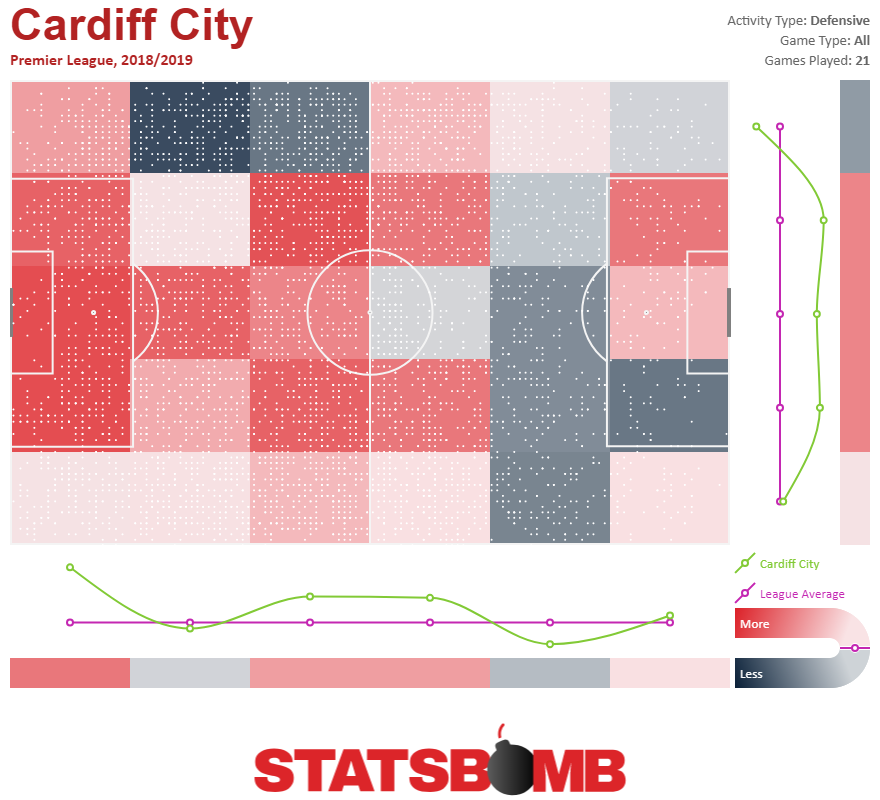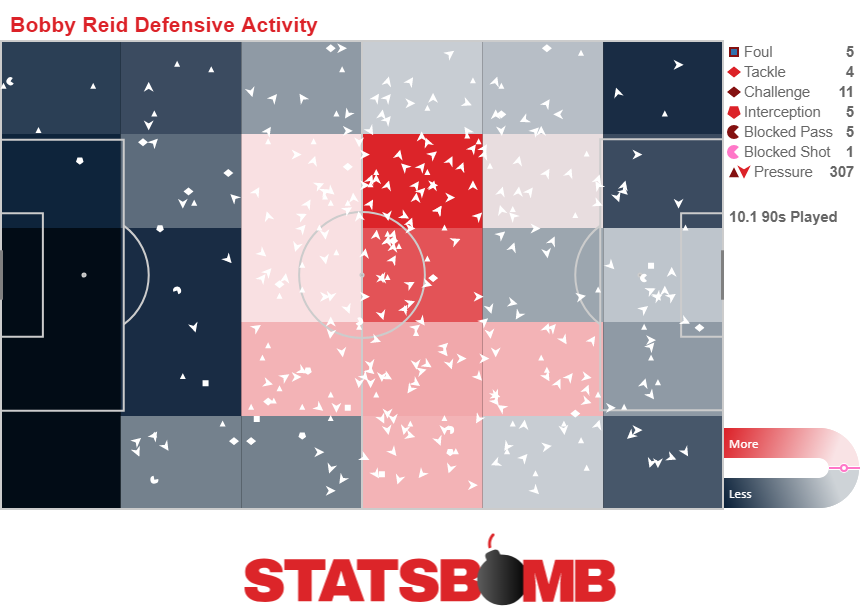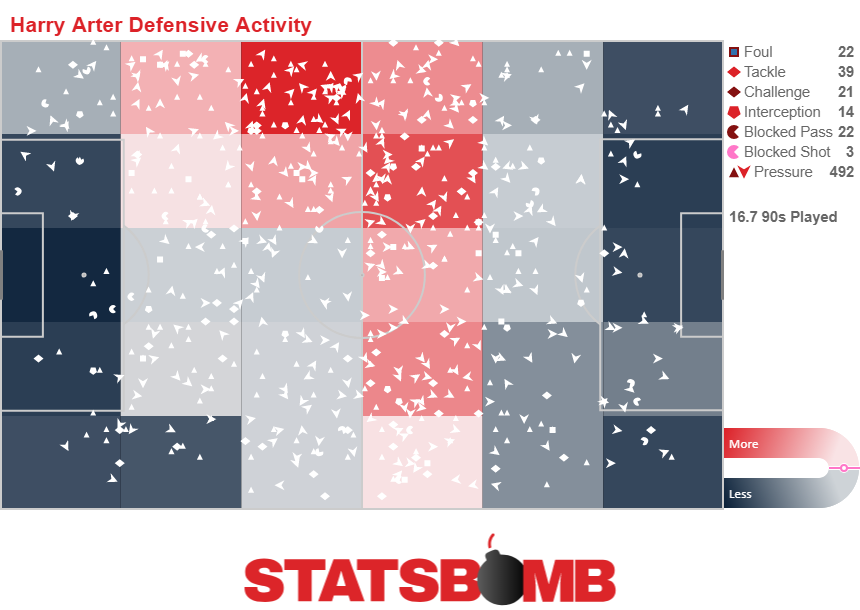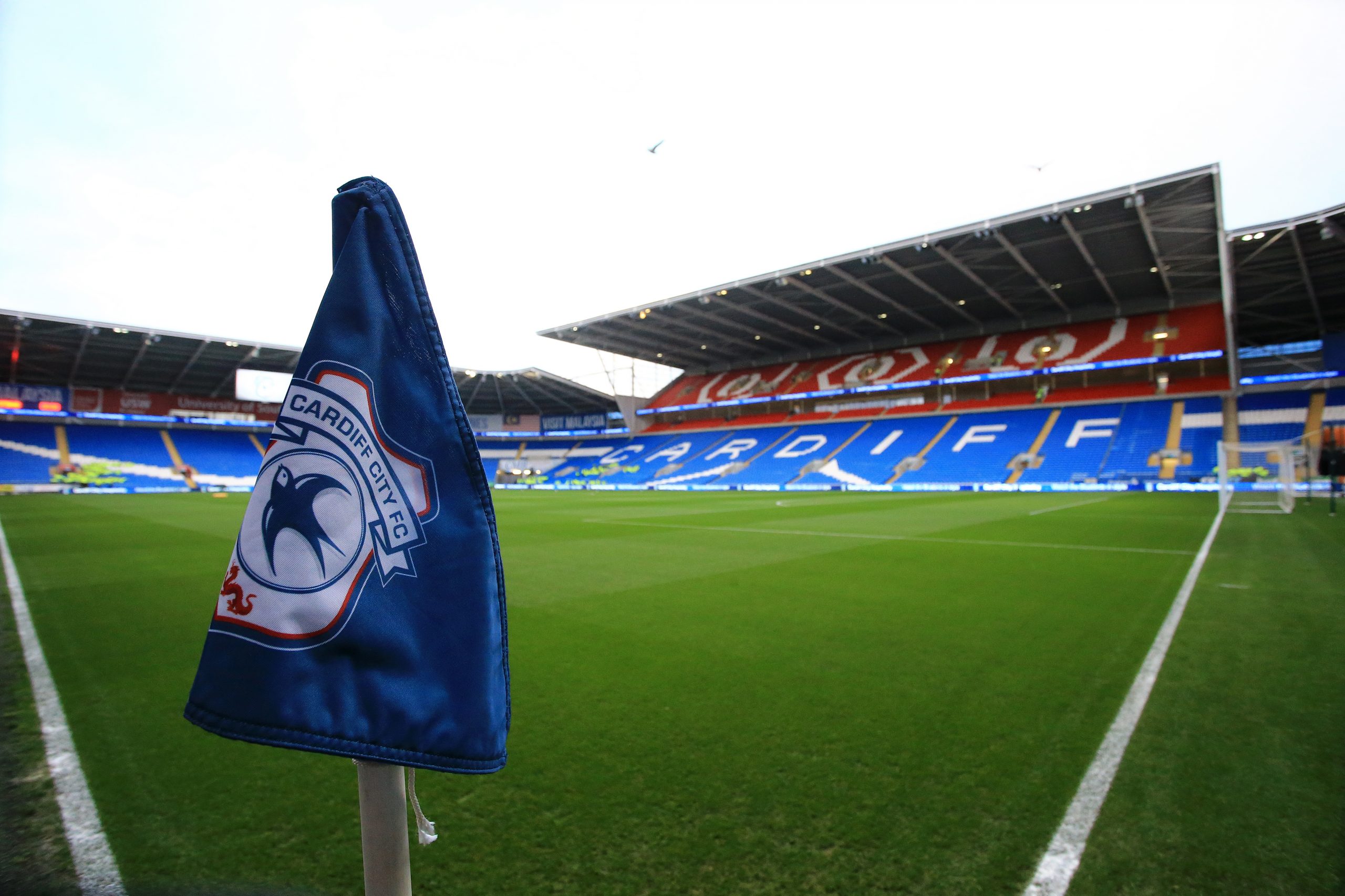Why aren’t Cardiff terrible? Obviously, the team isn’t good. They currently sit in 17th place in the Premier League, only two points above the dreaded relegation zone. But, for a team that was the favorite to finish last before the season started, 17th place counts as unlikely achievement. How are they managing it? As always, the place to start is the numbers. Their underlying expected goals totals on both sides of the balls support their place in the table. Nobody will confuse Cardiff with a strong attacking team, but their 1.02 expected goals scored per 90 match is better than five other teams in the Premier League. Similarly, in defense, the 1.42 xG they concede per match to opponents is lower than five other teams. Put it all together and you have an xG difference of -0.41 (yay rounding) which places them above Fulham, Huddersfield Town, Burnley, Newcastle, and perhaps surprisingly, Brighton and Hove Albion. Their attack is a simple but effective one. They play the fewest passes per match, 315, of any side in England’s top flight. When they have the ball, they play fast, and they play direct. When Neil Etheridge restarts play in goal, he does it by launching the ball down the field. His kicks average over 64 yards, the longest of any keeper in the Premier League. Nobody in the league plays more unpressured long balls than Etheridge. Given that he’s played the longest passes, it’s unsurprising that Etheridge’s 36% pass completion rating is the lowest in the league. Many of the imbalances in Cardiff’s numbers stem from this tactical decision. The fact that they have so little of the ball is in large part because they are choosing to launch the ball upfield, happy to trade possession for territory. It’s not a revolutionary strategy. But, it is a strategy, and it’s one that Cardiff are executing effectively. Importantly, by playing extremely quickly and directly Cardiff are managing to keep their xG per shot numbers relatively respectable. At 0.09 xG per shot, Cardiff are 12th in the league. It’s nothing to write home about, but it’s just about good enough to make everything work even though the team only takes 11 shots, the fourth fewest, per match. They’re walking a precarious path, turning just enough long balls from goals into fast shots that are just good enough to be respectable. Combined that keeps their attack just above relegation level, but if either aspect slips they’ll be in trouble. Cardiff’s attack is simple but effective. It’s also basically the same way they approached the Championship. Although, in the Championship their superior physicality translated that approach into more success. They won more balls, took more shots, and in general converted more of their fast attacks into goals. But, while the attack has been consistent, if better than expected, it’s Cardiff’s defense that has been a surprise. Neil Warnock turned a defense that was basically a conservative deep block in the Championship into a much more active unit in the Premier League. As soon as the opposition enters Cardiff’s half they’re harried all over the pitch.  Bobby Reid (when he’s on the field) and Harry Arter in particular have been let lose to run around and bother the opposition. They are third and fourth in the Premier League respectively with 30.34 and 29.46 pressures per 90 minutes. Reid’s efforts are understandably focused centrally, he’s a forward after all. But it’s telling that his job is to actually pressure the ball as soon as it crosses the halfway line, not continue to drop back behind it as the team sags off.
Bobby Reid (when he’s on the field) and Harry Arter in particular have been let lose to run around and bother the opposition. They are third and fourth in the Premier League respectively with 30.34 and 29.46 pressures per 90 minutes. Reid’s efforts are understandably focused centrally, he’s a forward after all. But it’s telling that his job is to actually pressure the ball as soon as it crosses the halfway line, not continue to drop back behind it as the team sags off.  Arter, on the other hand, is a hound in midfield. He’s constantly challenging passers, obstructing passing lanes and generally making it a pain in the butt for teams to move the ball through him and break the lines.
Arter, on the other hand, is a hound in midfield. He’s constantly challenging passers, obstructing passing lanes and generally making it a pain in the butt for teams to move the ball through him and break the lines.  Arter, with Reid in front of him, makes it a real challenge for teams to attack through Cardiff’s center, and Warnock’s men can therefore force the ball to the wings where their defense is more than happy to deal with the crosses that come their way. Despite having very little of the ball, Cardiff is surprisingly effective at not being forced back deep into their own half. Their average defensive action comes 42.06 yards from their own goal. Nine teams, defend deeper than that. Their shots conceded number isn’t great, only three teams concede more than Cardiff’s 14.38, but given that they choose to have so little possession, it’s surprising it isn’t worse. On top of that seven teams give up a higher average xG per shot than Cardiff’s 0.10. Just like in attack Cardiff are treading that middle ground. They give up a lot of shots, but not so many that it kills them. The shots they give up are of below average danger, but not so innocuous that they have very much room to spare. They do just enough in both aspects to produce a defense that’s above relegation level, but not much above relegation level. Cardiff are unique. Usually teams that have very little of the ball do so because of the defensive choices they make. Sitting deep might increase their ability to stop opponents, but it makes it harder to keep possession when you get it. Having men behind the ball makes it harder to hit outlet passes, lets opponents pressure you and pin you in, and just in general slants the field against. But Cardiff’s low possession numbers hinge much more heavily on their attacking choices. They give the ball back a lot because they are maniacally committed to getting the ball up the field quickly at the expense of maintaining possession. What’s important, and what has been the key to their modicum of success, is that their defense then does the work of making sure the team doesn’t get pinned in. Rather than inviting teams onto their back line, and trying to hold the fort around their 18 yard box, Cardiff engage higher up in their own half. They have the freedom to attack directly because their midfield provides an effective shield to keep the ball from coming right back when they lose it. Warnock has instilled a plan in his team that, as of now, might see them through to an unlikely second consecutive season in the Premier League. Both in attack and in defense they’ve put the pieces together to generate just enough performance to keep them above the drop. If that continues over the second half of the season it will be a true accomplishment, and one that very few people saw coming.
Arter, with Reid in front of him, makes it a real challenge for teams to attack through Cardiff’s center, and Warnock’s men can therefore force the ball to the wings where their defense is more than happy to deal with the crosses that come their way. Despite having very little of the ball, Cardiff is surprisingly effective at not being forced back deep into their own half. Their average defensive action comes 42.06 yards from their own goal. Nine teams, defend deeper than that. Their shots conceded number isn’t great, only three teams concede more than Cardiff’s 14.38, but given that they choose to have so little possession, it’s surprising it isn’t worse. On top of that seven teams give up a higher average xG per shot than Cardiff’s 0.10. Just like in attack Cardiff are treading that middle ground. They give up a lot of shots, but not so many that it kills them. The shots they give up are of below average danger, but not so innocuous that they have very much room to spare. They do just enough in both aspects to produce a defense that’s above relegation level, but not much above relegation level. Cardiff are unique. Usually teams that have very little of the ball do so because of the defensive choices they make. Sitting deep might increase their ability to stop opponents, but it makes it harder to keep possession when you get it. Having men behind the ball makes it harder to hit outlet passes, lets opponents pressure you and pin you in, and just in general slants the field against. But Cardiff’s low possession numbers hinge much more heavily on their attacking choices. They give the ball back a lot because they are maniacally committed to getting the ball up the field quickly at the expense of maintaining possession. What’s important, and what has been the key to their modicum of success, is that their defense then does the work of making sure the team doesn’t get pinned in. Rather than inviting teams onto their back line, and trying to hold the fort around their 18 yard box, Cardiff engage higher up in their own half. They have the freedom to attack directly because their midfield provides an effective shield to keep the ball from coming right back when they lose it. Warnock has instilled a plan in his team that, as of now, might see them through to an unlikely second consecutive season in the Premier League. Both in attack and in defense they’ve put the pieces together to generate just enough performance to keep them above the drop. If that continues over the second half of the season it will be a true accomplishment, and one that very few people saw coming.
2019
Cardiff's (Modest) Success Story
By Kevin Lawson
|
January 9, 2019
